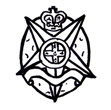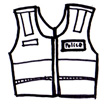Police can
- Ask for your name and address
- Search you and your bags
- Take your stuff if it’s illegal or it’s evidence of a crime
- Fine or arrest you
- Order you to move on
Police can’t
- Take your stuff if it’s not illegal and they don’t need it for evidence
- Take your phone away if they don’t need it for evidence
- Force you to delete data from your phone
- Say racist or abusive things
- Use unnecessary force
On this page
About Police
What do they look like?


- Wear a dark blue uniform
- If they wear a high-viz vest, they have “Police” written across the back
- May be in plain clothes
They carry
- Guns
- Tasers
- Pepper spray
- Handcuffs
- Batons
Giving your details
When can police ask for my details?
No matter where you are, police can ask you for your name and address. They usually only ask you if they think:
- You have broken the law
- You are about to break the law
- You witnessed a crime
- You should be moved on
They can also ask you for your date of birth or proof of age if they suspect you are drinking underage.
Do I need to give them my name and address?
You must give police your name and address if they have a lawful reason to ask you. If you refuse, you can be charged in court and you may end up with a criminal record. Even if you’re not sure police have a good reason to ask you for your details, you should still cooperate at the time and then make a complaint about it later.
What if I don’t have ID or I’m homeless?
If you don’t have ID or a fixed address, then police might hold you until they can confirm who you are and where you live. If you don’t have proof of identity or an address, then:
- Give them the details of a friend, relative or youth worker they can call to confirm your identity
- Show them Centrelink or bank cards with your name on them
- Show them a letter with your name and address on it
What if I give them false details, or I refuse?
It’s never a good idea to give false details, or to refuse to provide your name and address. Even if you’ve done nothing else wrong, you can be charged and you may get a criminal record.
Being searched
What can police search me for?
Police are allowed to search you, your clothing or your bags if they suspect you are carrying
- Weapons
- Drugs
- Graffiti equipment, like spray cans or markers, if they catch you trespassing or if you are at or near a train station
What if I’m under 18?
If you’re under 18, police can still search you for weapons or drugs without a warrant. Police can also search you for graffiti equipment without a warrant, as long as you are age 14 or over.
Police also have special powers to search you if you are under 18 and they think you are chroming.
Although police can take alcohol away from you and charge or fine you if they see you carrying it, they cannot search you or your bags just to look for hidden alcohol. They must have another reason to search you.
If you are under 18, police should have a parent or guardian present if they do a pat-down search or a strip search. However, they don’t have to do this if it’s not practical in the circumstances.
Don’t they need a warrant?
Police don’t need a warrant to search you or your bags for illegal weapons, illegal drugs or illegal graffiti equipment, as long as they have reason to suspect you are carrying those items or you are in a “designated area”.
What is a “reasonable suspicion”?
Unless you are in a “designated area”, police need to have a reason to suspect you are carrying drugs, illegal weapons or graffiti equipment to be able to search you for those items. Just being in an area where there’s a lot of violent crime, drugs or graffiti around can be enough reason to search you.
What is a “designated area”?
Designated areas are special zones that police have the power to create for up to 12 hours. If you are in a designated area, police don’t need a reason to search you and you may be charged if you don’t cooperate. Police usually declare these areas in train stations or places where there is a lot of violent crime. Police must show you a notice before they search you to tell you that you are in a designated area. Police can give advance warning in the local newspaper that they will declare a place a designated area but they don’t always have to do that. You may not know you are in a designated area until police come up to you and search you.
Can they do pat-down searches?
Yes. That means police can feel over or outside your clothes, ask you to empty your pockets or remove outer clothing, use a metal detector or ask you to show them any weapons they believe you are carrying. If possible, the police officer who performs the pat-down search should be the same sex as you but if no one of the same sex is nearby they can still do a pat-down search anyway.
Can they do strip searches?
Yes. Police rarely do strip searches but they are allowed to remove clothing during a search if they think it is necessary to find what they’re looking for. They can only do it in a private place, like a police station or a room that’s out of public view. Any strip search has to be by a police officer who is the same gender as you. If you are under 18, police should have a parent or guardian present unless it’s not practical in the circumstances.
What if I resist a search?
If you resist a search, you may be charged in court and you may end up with a criminal record. That can happen even if you weren’t carrying anything illegal in the first place.
Taking your stuff
When can police take your stuff?
Police can confiscate your stuff if they need it to prove a crime, whether that’s against you or someone else. They can also confiscate something if it’s illegal for you to be carrying it.
What items can be illegal to carry?
- Weapons. It’s illegal to carry weapons in public without a lawful excuse. A knife or a box-cutter is usually considered a weapon unless you have a good reason (like work) for carrying one.
- Spray cans or graffiti equipment. It’s illegal to carry spray cans or other graffiti equipment like permanent markers if you are on or near a train station, unless you can prove you need those items for your job.
- Alcohol. It’s illegal for anyone to carry open containers of alcohol on public transport and if you are under 18, it’s illegal to carry any alcohol in public.
- Drugs. It’s illegal to carry drugs, even if it’s a small amount of marijuana. Police can caution you if it’s a small amount, but they may decide to charge you in court instead.
What if I need to carry knives, box-cutters or spray cans for work?
If you need to carry knives, box-cutters or spray cans for work, it’s a good idea to have a letter from your employer with you so you can show police if they search you.
Can they take my phone?
It’s not illegal to photograph or film an incident if it happens out in the open and in a public place. However, police may want to take your phone away if they need to view or copy any photos or videos as part of an investigation against you or somebody else. If you’re worried about police taking your phone away, you can offer to text or email them any videos or photos from your phone in front of them so they don’t need to take it off you.
What if police confiscate something?
Police will usually keep a record of what they’ve taken and you can ask for a copy of that record afterwards. If police confiscate something that is illegal, then you are unlikely to get it back. If the item is not illegal and it’s just been taken to be used as evidence, then you should be able to get it back in the future. You can ask police if you will be getting your stuff back, and when. If you’re not happy with their answer, then please get legal advice.
Getting arrested
When can they arrest me?
Police can arrest you if they have a warrant. They can also arrest you without a warrant if they think:
- You’ve broken the law
- You’re drunk in public
- You may be violent towards a partner, ex-partner or family member
Can they use force to arrest me?
Police can use force to arrest you, but it must be reasonable force. That means they can only use as much force as is necessary to arrest you. If you resist or fight back, then they are allowed to use more force against you.
Can they take me away if I’m not under arrest?
There are special situations when police can take you away without arresting you. If they think you have a mental illness and you may harm yourself or others, then they might take you away to a hospital. If you’re under 18 and they suspect you are chroming, then they are also allowed to take you away and put you in the care of a parent, guardian or a social service to keep you safe.
Getting a fine
What can police fine me for?
For some less serious offences, police can give you a fine instead of charging you in court. Police should tell you why you are getting the fine and you should get a notice on the spot or in the mail. The notice should explain why you got the fine, how much it is and the due date for payment.
What can I do if I get a fine?
If you get a fine and you think it’s unfair or you can’t afford to pay, you should find out more about your options. If you are under 18 or you have an intellectual disability, you should get legal advice about your options. You should also get legal advice about your options if you were experiencing homelessness, a mental illness or an addiction to drugs or alcohol at the time.
Being moved on
When can police order me to move on?
A “move on order” means that you must leave the area. Police can order you to move on for up to 24 hours if they think:
- You are a danger to other people’s safety
- You may damage property
- You are breaching the peace or likely to breach the peace
The law isn’t clear on what breaching the peace means but it usually means disturbing others in some way.
What if I am there to protest or take part in strike action?
Police cannot order you to move on for protesting or expressing your views about a particular issue, or if you are taking part in strike action.
What if I go back?
It’s illegal to return to a place you’ve been ordered to move on from, even if you left something behind or you need to go back there to get home. If you go back before the time on the order is up, then you might be fined or charged in court. Even if you think police had no good reason to move you on, you should stay out of the area and make a complaint about it later.
Making a complaint
HomeIf you think you’ve been unfairly treated by police, then you should seek legal advice. It can be difficult to make a complaint and complaining may have an impact on any court cases you have running against you at the moment. Remember, there are free services available to help you. Get free advice now
